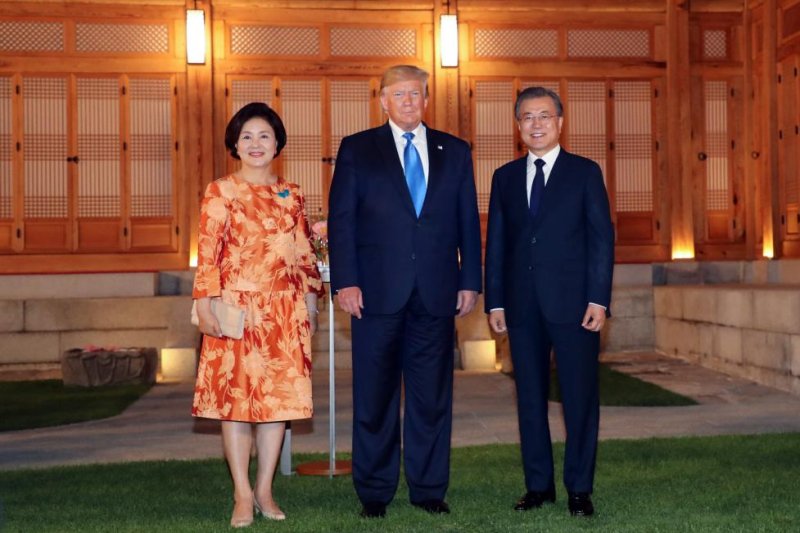South Korean President Moon Jae-in (R) and his wife, Kim Jung-sook (L), pose for a photo with U.S. President Donald Trump (C) before a welcome dinner at the presidential Blue House in Seoul on Saturday. Kim’s choice of jewelry, a turquoise butterfly pin, is being criticized by South Korea’s political opposition. File Photo by Yonhap/EPA-EFE
July 1 (UPI) -- South Korea's main opposition party conservatives claimed Monday the nation's first lady was protesting U.S. missile defense with a jewelry pin she wore during President Donald Trump's visit to the country.
Liberty Korea Party spokesman Min Kyung-wook said in a Facebook post a turquoise butterfly first lady Kim Jung-sook wore during Trump's meeting at the presidential Blue House was identical to pins distributed by anti-THAAD activists in the country, News 1 reported.
"The blue butterfly is a symbol of opposition to THAAD, which deters North Korea's nuclear program," Min said. "The Blue House should reveal the reason why the first lady wore a blue butterfly pin when she met with President Trump."
Min was not alone in his criticism of Kim. South Korean commenters online had been suggesting the first lady's choice of jewelry resembled the anti-THAAD pins of activist groups.
The United States and South Korea agreed in 2016 to deploy THAAD batteries in central South Korea to track and deter North Korean missiles.
South Korean groups opposed to the deployment had said at the time missile defense would have an adverse impact on local communities.
The Moon Jae-in administration responded swiftly to the allegations on Monday, and said the first lady's decorative pin contained no political symbolism.
THAAD continues to be deployed in the South. The deployment was a brief flashpoint when Trump said Seoul should pay for the operation of the system.
Trump may have raised the issue of military cost sharing during his recent trip to Korea, according to Newsis.
In a meeting with South Korean business leaders on Sunday, Trump said the United States had been exhausted while intervening in other countries.
He also said there are 42,000 U.S. troops stationed in the South, and that they are doing important things.
It is unclear where Trump received the number -- there are 28,500 U.S. service members on the peninsula, and about 50,000 troops in neighboring Japan.
South Korea agreed to raise its contribution for the upkeep of U.S. troops by 8.2 percent. It pays $915 million under the agreement signed in 2019. The agreement could be renegotiated next year.















